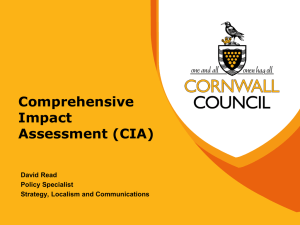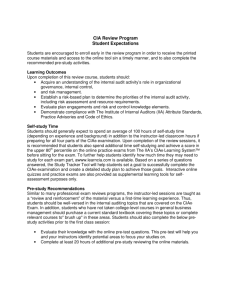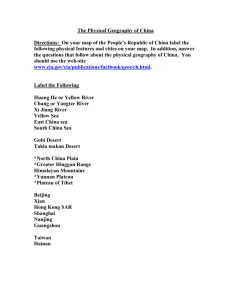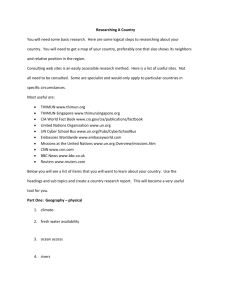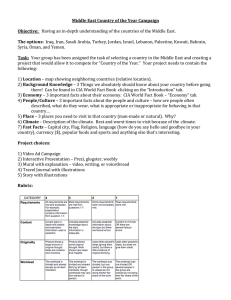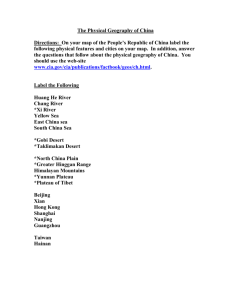Statement of Jim Marcinkowski July 22, 2005
advertisement
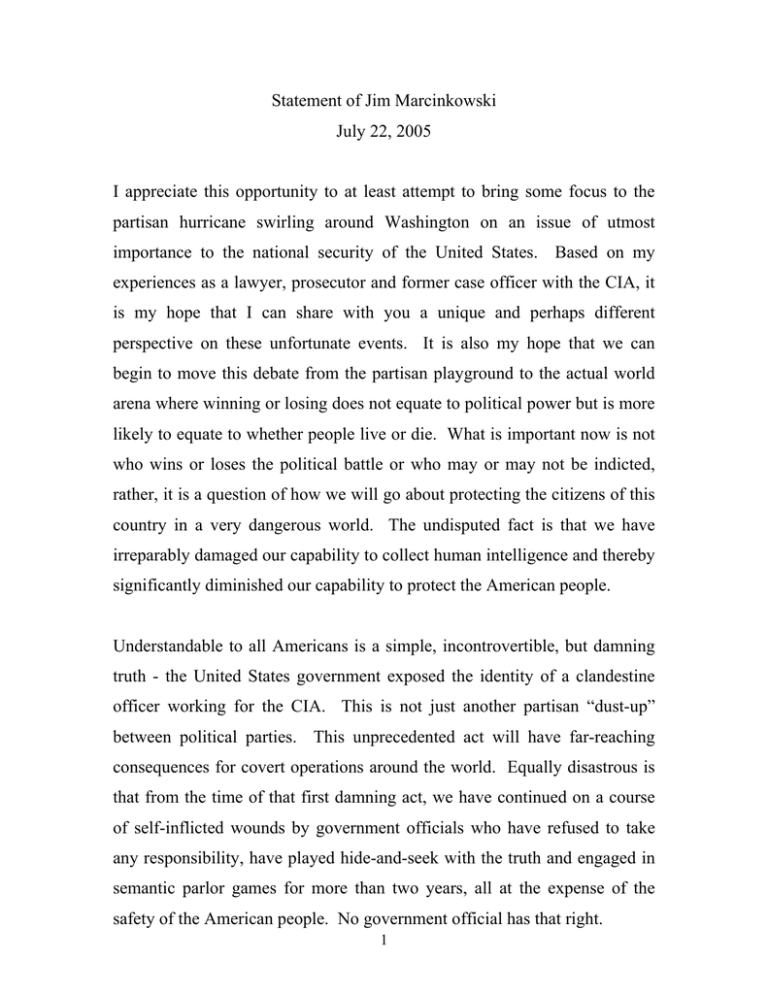
Statement of Jim Marcinkowski July 22, 2005 I appreciate this opportunity to at least attempt to bring some focus to the partisan hurricane swirling around Washington on an issue of utmost importance to the national security of the United States. Based on my experiences as a lawyer, prosecutor and former case officer with the CIA, it is my hope that I can share with you a unique and perhaps different perspective on these unfortunate events. It is also my hope that we can begin to move this debate from the partisan playground to the actual world arena where winning or losing does not equate to political power but is more likely to equate to whether people live or die. What is important now is not who wins or loses the political battle or who may or may not be indicted, rather, it is a question of how we will go about protecting the citizens of this country in a very dangerous world. The undisputed fact is that we have irreparably damaged our capability to collect human intelligence and thereby significantly diminished our capability to protect the American people. Understandable to all Americans is a simple, incontrovertible, but damning truth - the United States government exposed the identity of a clandestine officer working for the CIA. This is not just another partisan “dust-up” between political parties. This unprecedented act will have far-reaching consequences for covert operations around the world. Equally disastrous is that from the time of that first damning act, we have continued on a course of self-inflicted wounds by government officials who have refused to take any responsibility, have played hide-and-seek with the truth and engaged in semantic parlor games for more than two years, all at the expense of the safety of the American people. No government official has that right. 1 The Use of "Cover." For an understanding of what is at stake it is important to understand some fundamental principles. No country or hostile group, from al Queda to any drug rings operating in our cities, likes to be infiltrated or spied upon. The CIA, much like any police department in any city, has undercover officers spies, that use "cover." To operate under “cover”, means you use some ruse to cloak both your identity and your intentions. The degree of cover needed to carry out any operation varies depending on the target of the investigation. A police officer performing “street buys” uses a “light” cover, meaning he or she could pose as something as simple as a drug user, operate only at night and during the day, believe it or not, have a desk job in the police station. On the other hand, if an attempt were made to infiltrate a crime syndicate, visiting the local police station or drinking with fellow FBI agents after work may be out of the question. In any scenario, your cover, no matter what the degree, provides personal protection and safety. But it does not end there. Cover is also used to protect collection methodology as well as any innocent persons a CIA officer may have regular contact with such as overseas acquaintances, friends, and even other U.S. government officials. The Mutual Dependency of Cover While cover provides a degree of safety for the case officer, it also provides security for that officer's informants or agents. In most human intelligence operations, the confidentiality of the cover used by a CIA officer and the personal security of the agent or asset is mutually dependent. A case officer 2 cannot be identified as working for the CIA, just as the informant/agent cannot be identified as working for the CIA through the case officer. If an informant or agent is exposed as working for the CIA, there is a good chance that the CIA officer has been identified as well. Similarly, if the CIA officer is exposed, his or her agents or informants are exposed. In all cases, the cover of a case officer ensures not only his or her own personal safety but that of the agents or assets as well. The Effects of Exposure The exposure of Valerie Plame’s cover by the White House is the same as the local chief of police announcing to the media the identity of its undercover drug officers. In both cases, the ability of the officer to operate is destroyed, but there is also an added dimension. An informant in a major sophisticated crime network or a CIA asset working in a foreign government, if exposed, have a rather good chance of losing more than just their ability to operate. Any undercover officer, whether in the police department or the CIA, will tell you that the major concern of their informant or agent is their personal safety and that of their family. Cover is safety. If you cannot guarantee that safety in some form or other, the person will not work for you and the source of important information will be lost. So how is the Valerie Plame incident perceived by any current or potential agent of the CIA? I will guarantee you that if the local police chief identified the names of the departments undercover officers, any half-way sophisticated undercover operation would come to a halt and if he survived 3 that accidental discharge of a weapon in police headquarters, would be asked to retire. And so the real issue before this congress and this country today is not partisan politics, not even the loss of secrets. The secrets of Valerie Plame’s cover are long gone. What has suffered perhaps irreversible damage is the credibility of our case officers when they try to convince our overseas contacts that their safety is of primary importance to us. How are our case officers supposed to build and maintain that confidence when their own government cannot even guarantee the personal protection of the home team? While the loss of secrets in the world of espionage may be damaging, the stealing of the credibility of our CIA officers is unforgiveable. The Criminal "Wait and See" It is not my intention to downplay the significance of the work of the special prosecutor in this matter. As a prosecutor, and simply living in a country governed by the rule of law, I understand the importance of that work. As a former case officer however, I have at least a minimal understanding of the impact of political capitulation to lengthy criminal processes and the resulting "wait and see" attitude. While we in this country may accept this process, overseas, quite simply, it doesn't play. CIA officers recruit foreign agents to spy on their own country. I am not aware of any country in the world where spying is not a criminal act. The fact is, CIA officers recruit agents to break the law. That's the nature of spying. How is a case officer to alleviate the safety concerns of their agents by referencing legal processes when in fact they need to minimize the 4 importance of law in order to have those same agents provide useful information? While blind deference to legal niceties maybe accepted within the context of American politics, in an overseas setting, it just doesn't work. When it comes to personal security and safety, a potential foreign national recruit should not be expected to understand, much less accept, legalistic notions of criminal intent, reckless disregard, negligence or just plain ignorance. And even if such concepts were understood, what is going to be the result? A presidential pardon? Such notions are not without precedent. The only concern that matters is "can you protect me if I do this for you?" Self-Inflicted Wounds And so we are left with only one fundamental truth, the U.S. government exposed the identity of a covert operative. I am not convinced that the toothpaste can be put back into the tube. Great damage has been done and that damage has been increasing every single day for more than two years. The problem of the refusal to accept responsibility by senior government officials is ongoing and causing greater damage to our national security and our ability to collect human intelligence. But the problem lies not only with government officials but also with the media, commentators and other apologists who have no clue as to the workings of the intelligence community. Think about what we are doing from the perspective of our overseas human intelligence assets or potential assets. I believe Bob Novak when he credited senior administration officials for the initial leak, or the simple, but not insignificant confirmation of that secret information, as I believe a CIA officer in some far away country will lose an 5 opportunity to recruit an asset that may be of invaluable service to our covert war on terror because “promises of protection” will no longer carry the level of trust they once had. Each time the leader of a political party opens his mouth in public to deflect responsibility, the word overseas is loud and clear – politics in this country does in fact trump national security. Each time a distinguished ambassador is ruthlessly attacked for the information he provided, a foreign asset will contemplate why he should risk his life when his information will not be taken seriously. Each time there is a perceived political "success" in deflecting responsibility by debating or re-debating some minutia, such actions are equally effective in undermining the ability of this country to protect itself against its enemies, because the two are indeed related. Each time the political machine made up of prime-time patriots and partisan ninnies display their ignorance by deriding Valerie Plame as a mere “paper-pusher”, or belittling the varying degrees of cover used to protect our officers, or continuing to play partisan politics with our national security, it is a disservice to this country. By ridiculing, for example, the “degree” of cover or the use of post office boxes, you lessen the level of confidence that foreign nationals place in our covert capabilities. Those who would advocate the "I'm ok, you're ok" politics of nonresponsibility, should probably think about the impact of those actions on our foreign agents. Non-responsibility means we don’t care. Not caring means a loss of security. A loss of security means a loss of an agent. The 6 loss of an agent means the loss of information. The loss of information means an increase in the risk to the people of the United States. There is a very serious message here. Before you shine up your American flag lapel pin and affix your patriotism to your sleeve, think about what the impact your actions will have on the security of the American people. Think about whether your partisan obfuscation is creating confidence in the United States in general and the CIA in particular. If not, a true patriot would shut up. Those who take pride in their political ability to divert the issue from the fundamental truth ought to be prepared to take their share of the responsibility for the continuing damage done to our national security. When this unprecedented act first occurred, the president could have immediately demanded the resignation of all persons even tangentially involved. Or, at a minimum, he could have suspended the security clearances of these persons and placed them on administrative leave. Such methods are routine with police forces throughout the country. That would have at least sent the right message around the globe, that we take the security of those risking their lives on behalf of the United States seriously. Instead, we have flooded the foreign airwaves with two years of inaction, political rhetoric, ignorance, and partisan bickering. That's the wrong message. In doing so we have not lessened, but increased the threat to the security and safety of the people of the United States. Jim Marcinkowski 7
